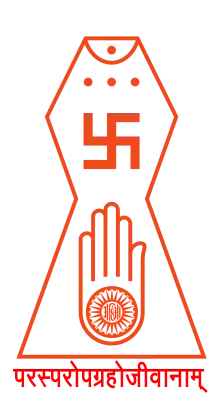Akalanka
Akalanka (also known as Akalank Deva and Bhatta Akalanka) was a Jain logician whose Sanskrit-language works are seen as landmarks in Indian logic.[1][2] He lived from 720-780 A.D. and belonged to the Digambara sect of Jainism.[1][3] His work Astasati, a commentary on Aptamimamsa of Acharya Samantabhadra deals mainly with jaina logic. He was a contemporary of Rashtrakuta king Krishna I. He is the author of Tattvārtharājavārtika, a commentary on major Jain text Tattvartha Sutra. He greatly contributed to the development of the philosophy of Anekantavada and is therefore called the "Master of Jain logic".[4][5]
Acharya Shri 108 Akalanka Ji Maharaj | |
|---|---|
 Image of Acharya Akalanka | |
| Personal | |
| Born | 720 CE |
| Died | 780CE |
| Religion | Jainism |
| Sect | Digambara |
| Part of a series on |
| Jainism |
|---|
 |
|
|
Life
Akalanka flourished in 750 AD.[6] He was aware of the contents of the Angas, although it cannot be said whether they represent an idea rather than a reality for him, and he also seems to have been the first Digambara to have introduced as a valid form of scriptural classification the division into kalika and utkalika texts which was also employed by the Svetambaras.[7] He is mentioned as a logician and a contemporary of Subhatunga and Rashtrakuta king Krishna I.[6]
Works
The following Sanskrit-language works are attributed to Akalanka. Some of these are:[8][9]
- Laghiyastraya
- Pramānasangraha
- Nyāyaviniscaya-vivarana
- Siddhiviniscaya-vivarana
- Astasati
- Tattvārtharājavārtika
See also
- Acharya Shri Akalanka Educational Trust
- Karanthai Samadhi of Acharya Akalanka at Thurupammor-Karanthai, Tamilnadu [10]
Notes
- Akalaṅka; Goyal, Devendra Kumar (1 January 2005). The Enlightened Vision of the Self. p. 1,2. ISBN 9788170272441.
- Ganga Ram Garg (1992). Encyclopaedia of the Hindu World. Concept. p. 288. ISBN 978-81-7022-375-7.
- Singh & Baruah 2003, p. 9.
- Singh & Baruah 2003, p. 110.
- Singh & Mishra 2007, pp. 9–13.
- Vidyabhusana 2006, p. 186.
- Dundas 2002, p. 80.
- Singh & Baruah 2003, p. 32.
- Sures Chandra Banerji (1989). A Companion to Sanskrit Literature. Motilal Banarsidass. p. 10. ISBN 978-81-208-0063-2.
- Pushpathanathar Jain Temple, Thurupammor-Karanthai
References
- Dundas, Paul (2002) [1992], The Jains (Second ed.), Routledge, ISBN 0-415-26605-X
- Singh, N.K.; Mishra, A.P. (2007), Encyclopaedia of Oriental Philosophy, 7, Global Vision Publishing House, ISBN 978-81-8220-113-2
- Singh, Nagendra Kr; Baruah, Bibhuti (2003), Encyclopaedic Dictionary of Pali Literature, Global Vision Publishing House, ISBN 978-81-87746-67-6
- Vidyabhusana, Satis Chandra (2006) [1920], A History of Indian Logic: Ancient, Mediaeval and Modern Schools, Motilal Banarsidass, ISBN 81-208-0565-8